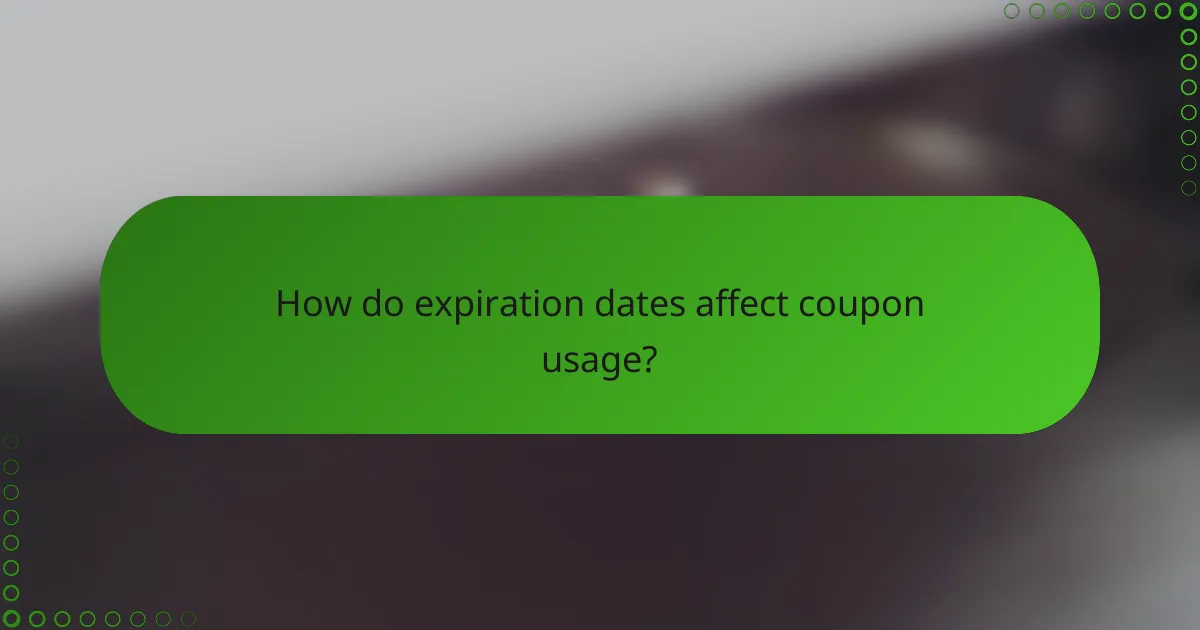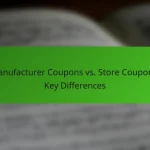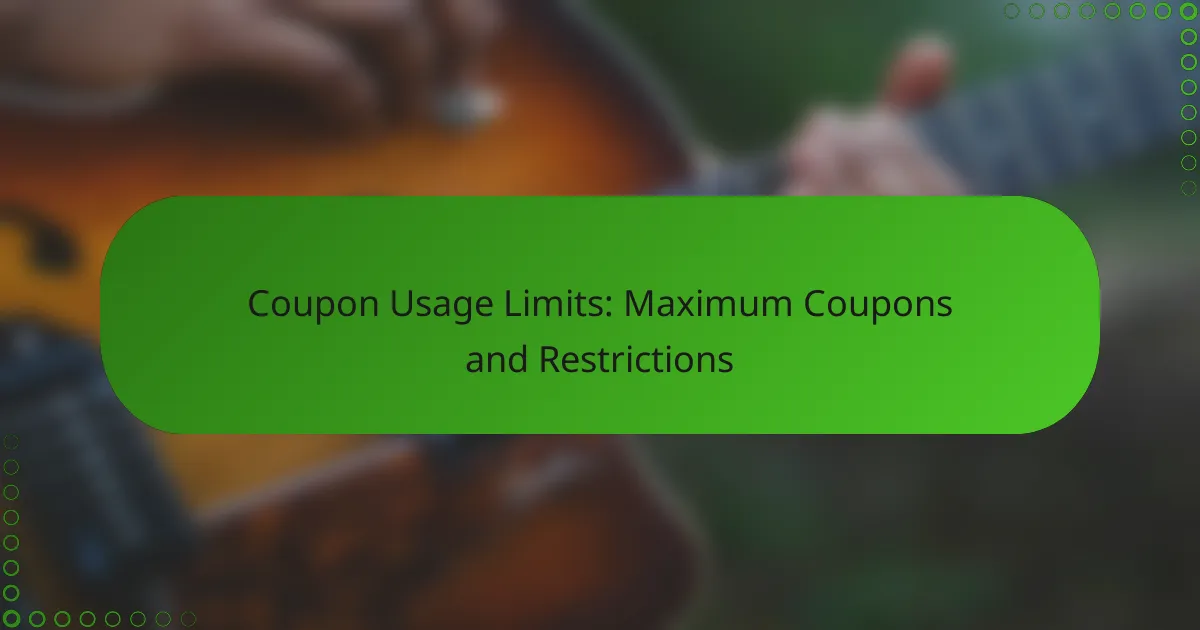Understanding coupon terms and conditions is essential for maximizing savings when shopping. These guidelines specify key details such as expiration dates, which indicate the valid period for redemption, and usage limits that determine how often a coupon can be applied. Being aware of these factors can help consumers avoid missing out on valuable discounts.

What are coupon terms and conditions?
Coupon terms and conditions are the specific rules and guidelines that dictate how a coupon can be used. They outline important details such as expiration dates, usage limits, and any restrictions that may apply to the coupon’s validity.
Definition of coupon terms
Coupon terms refer to the stipulations that govern the use of a coupon. These terms typically include the discount amount, eligible products or services, expiration dates, and any limitations on how many times a coupon can be redeemed. Understanding these terms is crucial for maximizing savings.
For instance, a coupon may offer a 20% discount but only on select items or during specific promotional periods. Being aware of these details helps consumers make informed purchasing decisions.
Importance of understanding terms
Grasping the terms and conditions of a coupon is essential to avoid disappointment at checkout. Many consumers overlook these details, which can lead to missed savings or invalid coupon attempts. Knowing the rules ensures that you can take full advantage of available discounts.
Additionally, understanding terms can help you plan your purchases strategically. For example, if a coupon expires soon, you might prioritize buying the eligible items before the deadline to ensure you don’t miss out on savings.
Common terms explained
Several common terms frequently appear in coupon conditions. Here are a few key ones:
- Expiration Date: The last date a coupon can be used. After this date, the coupon is no longer valid.
- Usage Limit: This indicates how many times a coupon can be redeemed, either per transaction or per customer.
- Exclusions: Specific products or categories that are not eligible for the coupon discount.
By familiarizing yourself with these terms, you can avoid common pitfalls and ensure that you are making the most of your coupons. Always read the fine print before attempting to use a coupon to ensure compliance with all conditions.

How do expiration dates affect coupon usage?
Expiration dates are crucial for coupon usage as they define the time frame within which a coupon can be redeemed. After the expiration date, the coupon is no longer valid, which can lead to missed savings if not monitored carefully.
Significance of expiration dates
Expiration dates serve as a clear guideline for consumers, ensuring that they use coupons within a specified period. This encourages timely purchases and helps retailers manage promotions effectively. Understanding these dates can prevent disappointment at checkout when a coupon is no longer valid.
Additionally, expiration dates can create urgency, prompting consumers to make purchases sooner rather than later. This tactic can drive sales and clear inventory, benefiting both shoppers and retailers.
Typical expiration periods
Most coupons have expiration periods ranging from a few weeks to several months, depending on the retailer and the promotion type. Commonly, coupons may last anywhere from 30 to 90 days after issuance. Some special promotions may even offer longer validity periods.
It’s important to check the specific expiration date on each coupon, as some may have unique terms. For instance, seasonal promotions or holiday sales might have shorter durations to encourage quick purchases. Always keep track of your coupons to maximize savings before they expire.

What are usage limits for coupons?
Usage limits for coupons refer to the restrictions placed on how many times a coupon can be redeemed or the conditions under which it can be used. These limits can significantly affect how consumers take advantage of discounts and promotions.
Types of usage limits
Usage limits can vary widely and may include restrictions such as a maximum number of redemptions per customer, a cap on the total number of coupons available, or specific conditions like only being valid on certain products. For example, a coupon might be limited to one use per transaction or only applicable to select items in a store.
Additionally, some coupons may have a time-based limit, meaning they can only be used during a promotional period or on specific days. Understanding these types of limits is crucial for maximizing savings opportunities.
Impact of limits on savings
Limits on coupon usage can significantly influence the overall savings a consumer can achieve. For instance, if a coupon allows only one redemption per customer, shoppers may need to plan their purchases carefully to make the most of the discount. This can lead to buying in bulk or coordinating with friends or family to share savings.
Moreover, understanding these limits can help avoid common pitfalls, such as attempting to use multiple coupons in a single transaction when store policy prohibits it. Consumers should always read the fine print to ensure they are fully aware of any restrictions that may affect their savings strategy.

How to find valid coupons?
To find valid coupons, start by exploring various online platforms and retailer-specific promotions. These sources can provide significant savings, but it’s essential to verify their expiration dates and usage limits to ensure they are still applicable.
Online coupon sources
Online coupon sources include websites and apps dedicated to aggregating discounts from various retailers. Popular sites like RetailMeNot, Coupons.com, and Honey offer a wide range of coupons that can be filtered by category or store. Always check the expiration dates and terms of use for each coupon before applying them.
Additionally, consider subscribing to newsletters from these coupon sites. Many offer exclusive deals and early access to promotions, which can enhance your savings potential. Be cautious of expired or invalid coupons, as they can lead to frustration at checkout.
Retailer-specific promotions
Retailer-specific promotions are discounts or coupons offered directly by stores, either in-store or online. Many retailers have loyalty programs that provide members with exclusive coupons and offers. Signing up for these programs can yield significant savings on future purchases.
Keep an eye on seasonal sales and special events, as many retailers release limited-time coupons during these periods. Always read the fine print regarding usage limits, as some promotions may restrict the number of coupons you can use in a single transaction or apply to specific items only.

What are the prerequisites for using coupons?
To use coupons effectively, you typically need to meet specific conditions set by the retailer. These prerequisites often include having an account, meeting minimum purchase amounts, and adhering to expiration dates.
Account requirements
Many retailers require customers to create an account to access coupon offers. This account may need to be verified through email or phone, ensuring that the user is legitimate. Additionally, some coupons may only be available to loyalty program members, adding an extra layer of requirement.
When signing up, be aware of any personal information requested, as well as the retailer’s privacy policy. Some retailers may send promotional emails or notifications related to your account, which can be beneficial for staying informed about new coupons.
Minimum purchase conditions
Coupons often come with minimum purchase requirements, meaning you must spend a certain amount to qualify for the discount. This threshold can vary widely, from a few dollars to higher amounts, depending on the retailer and the specific coupon.
For example, a coupon might require a minimum purchase of $50 to receive a $10 discount. Always check the terms of the coupon to avoid disappointment at checkout. If you are close to the minimum, consider adding items that you need to meet the requirement without overspending.

How do regional differences affect coupon terms?
Regional differences significantly impact coupon terms, including expiration dates, usage limits, and redemption policies. Variations can arise from local laws, retailer practices, and consumer behavior, making it essential to understand these nuances when using coupons in different areas.
Variations in U.S. coupon policies
In the U.S., coupon policies can vary widely by retailer and state. Some stores may allow stacking multiple coupons on a single purchase, while others may limit the use of one coupon per transaction. Additionally, many coupons have expiration dates ranging from a few weeks to several months, depending on the promotion.
It’s common for U.S. coupons to specify usage limits, such as “one per customer” or “while supplies last.” Shoppers should always read the fine print to avoid issues at checkout. For example, a coupon might only be valid for specific products or during certain promotional periods.
International coupon practices
Internationally, coupon practices can differ significantly from those in the U.S. In some countries, coupons are less common, while others may have more stringent regulations regarding their use. For instance, in Europe, many retailers offer digital coupons that can be redeemed through mobile apps, often with specific expiration dates and usage limits.
In markets like Japan, coupons may be integrated into loyalty programs, allowing customers to earn discounts based on their purchase history. Understanding these international practices is crucial for travelers or businesses looking to expand their marketing efforts abroad. Always check local regulations and retailer policies before attempting to use coupons in a new region.

What are emerging trends in coupon usage?
Emerging trends in coupon usage indicate a shift towards digital platforms and personalized offers. Consumers increasingly prefer mobile coupons and targeted promotions that align with their shopping habits.
Key Details
Key details of coupon usage include the types of discounts offered, their availability, and the terms attached. Coupons can provide percentage discounts, fixed dollar amounts off, or free shipping. Understanding the specific conditions, such as minimum purchase requirements or product exclusions, is crucial for maximizing savings.
Expiration Dates
Expiration dates are critical in coupon usage, as they dictate the timeframe within which a coupon can be redeemed. Most coupons have a validity period ranging from a few weeks to several months. Be mindful of these dates to avoid missing out on savings, and check for any specific time restrictions, such as weekends or holidays.
Usage Limits
Usage limits refer to the maximum number of times a coupon can be redeemed, which can vary by retailer. Some coupons may allow one-time use per customer, while others might permit multiple uses within a promotional period. Always read the fine print to understand these limits, as exceeding them can lead to denied transactions or unexpected charges.










